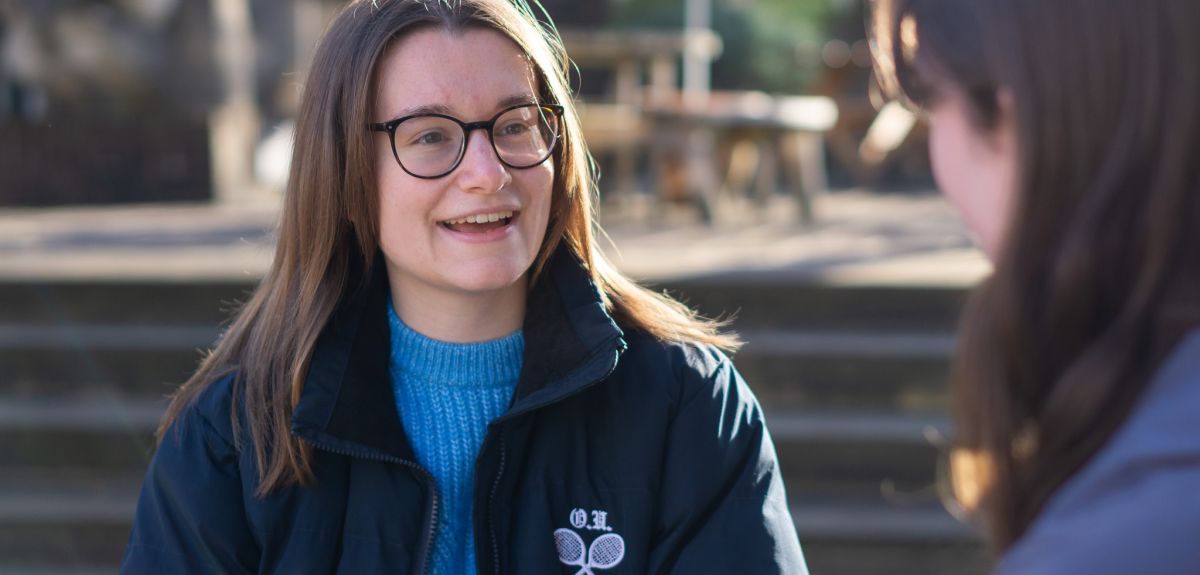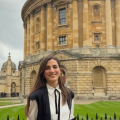
Student Stories: Reflections as a young carer
Holly Cobb is a second year French and Linguistics student, and one of several young carers studying at Somerville college. She joins us here to discuss the systemic challenges facing young carers and her own experience of balancing life as an Oxford student with her long-standing familial responsibilities.
The journey to Oxford
My life to date has been shaped indelibly by my experiences as a young carer. So when I got my place at Oxford, it seemed natural to me that the first thing I should do was google ‘Oxford University carers’. Full of nerves, of hope as well as guilt, I was anxious to see what support might be out there if I accepted the offer, and how that part of my identity might find expression. Unfortunately, Google didn’t seem to understand the question. ‘Did you mean “Oxford university careers”?’ the search machine asked, before serving up 2.5 million search results on just that topic.
Sadly, this experience is not an isolated one. Indeed, the term ‘young carer’ is often unfamiliar not just to search engines, but many of the people one meets. When you explain what it means, people tend to look blank, or awkward. Some respond with pity, while others seem hardly able to imagine such worlds exist.
Understanding young carers
It doesn’t help that the scale and diversity of experiences encompassed by the label is so vast. Legally, a young carer is defined as “a person under 18 who provides or intends to provide care for another person.” Most often, a young carer is someone who helps another family member with a mental or physical illness, a drug or alcohol dependency, or a disability, by providing a mixture of practical and emotional support usually expected of an adult.
However, the reality is much more complicated than this. According to The Children’s Society, there are at least 800,000 young carers in the UK alone – but the true number is likely to be a great deal higher. Most young carers do not know that they are carers, or do not see what they do as unusual; many are involved in household tasks and personal care from as young as five. It is hardly surprising, therefore, that they don’t see tasks such as administering medication, ringing the doctors, helping a family member get dressed, as well as acts of less easily defined emotional support, as anything unusual.
Progressing to higher education
Taking on these kinds of responsibility from an early age can foster close familial relationships and lead to higher levels of emotional intelligence from a young age – but it comes at a heavy cost. Young carers regularly report higher levels of stress and low mood because of their caring role. On average, they achieve an average of one grade lower at GCSE than their peers, who are less likely to take time off school or dedicate as much time to helping around the house. Some studies report that over 13,000 young carers are spending over 50 hours-a-week caring, on top of schoolwork.
Under such circumstances, it’s hardly surprising that many young carers never even consider higher education; they simply cannot imagine how their families would cope without them. Schools and universities are often unaware of the extra burden facing young carers, so their needs are rarely considered. In terms of widening participation criteria, young carers are often missed out, despite the link between being a young carer and identifying with other socioeconomic markers of disadvantage.
Happily, the situation is changing: many schemes and programmes for young carers across the country are becoming much more well established. Within Somerville, our wonderful Access and Inreach Support Officer Órla is very keen to recognise and celebrate young carers and young adult carers.
My experience
As for my own story, I am one of the lucky ones. After discovering the concept of a “young carer” for the first time during a school assembly at the age of 14, I, and other young carers in my school, were offered a constant network of support through youth groups, respite trips, and access to 1:1 project workers. Most importantly, we had a community who truly understood what it was like to have a sibling seriously ill in hospital, a parent who may not get out of bed every morning, or a daily routine involving everything from administering medication to discussions about upcoming hospital appointments, meltdowns, seizures, and so much more. Whilst I love my family, accessing this support was, quite literally, life-changing for me.
Finding my own way
Coming to university has made me much more reflective. In moving here, I have been forced to truly confront my own identity, and to question how much I was, or am anymore, defined by my caring role. What was and is still strange to me, is the realisation that for the first time, I am forging an identity for myself entirely divorced from being a young carer, from being known as “my sibling’s sibling”.
Yet, even as this new self gradually emerges, I am conscious of still being different. While my peers ring home to catch up each week, I ring home to discuss hospital appointments, general health, the level of independence my sibling will have, and where I fit into that. I cherish both my upbringing and my time in Oxford, but sometimes they seem to be entirely separate lives, and I often feel a sense of guilt about the detachment I am able to have from the day-to-day stresses I know my family is constantly facing.
Looking to the future
In acknowledging this inner conflict, I try to reframe my guilt as gratitude; I remind myself how lucky I am to have the opportunity to live and study here, and that I was not stopped from applying because of my caring by any self-imposed or practical barriers. I would also like to think that, while my experience can in no way compare to that of someone with lived experience of disability, I can perhaps be more empathetic and more attuned to inequalities that disabled people face, than I might have been had I not been exposed to this growing up.
I now volunteer for the same charity that identified and supported me for so many years, helping at some of the very same groups from which I benefitted. I see my younger self in so many of the young people attending, and I can only hope that one day they are able to plan their futures just as I once did, just as their peers do without thinking.
Advice for other students
Finally, I would like to say to anyone reading this for whom this story resonates, even if only slightly: you are seen and you are heard. No matter how big or small your caring role, no matter whether you were the primary or secondary carer, whether you cared for one or multiple people, whether you were a carer for your whole childhood or just a small part, or whether you have even considered yourself a “carer” at all; please know that the invisible work you do, may that be practical or emotional, is not insignificant. If you think any of this applies to you, or would like to discuss any of this, I would always love to chat and listen to your experience: carers care for others, but do not always have someone who cares for them.
To contact Holly and speak about the matters raised in this article, please contact [email protected]
Article adapted with kind permission from Somerville College.
 Student story: Finding space for Kosovo at Oxford
Student story: Finding space for Kosovo at Oxford
 Oxford students shortlisted as McCall MacBain Scholarship finalists
Oxford students shortlisted as McCall MacBain Scholarship finalists
 Student story: My time at Oxford has been deeply transformative
Student story: My time at Oxford has been deeply transformative
 Welfare blog: Dealing with imposter syndrome
Welfare blog: Dealing with imposter syndrome
 Student story: Rowing sabbatical officer
Student story: Rowing sabbatical officer